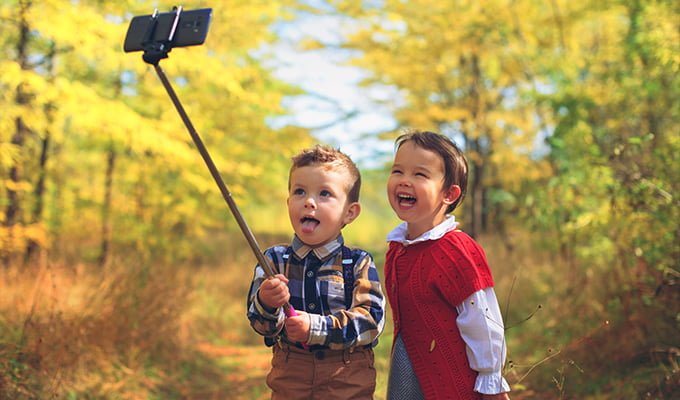Sharenting and the Dangers of Posting Your Children’s Pictures Online
Sharenting definition: When parents share too much of their children’s information, pictures and private moments online.

It’s no secret that many parents overshare stories and photos about their children online. After all, many of us have all been guilty of this. It’s easy to post updates when a child takes their first steps, learns how to blow bubbles in the pool, wins another dance competition, masters the uneven bars at a gymnastic meet, or scores another scholarship.
Today’s kids already have an extensive digital presence even before they can tie their shoes or count to ten. While it’s great to share our children’s accomplishments, posting those sweet baby photos or achievements can hurt our sons and daughters in the years to come. We need to be aware of how those photos and posts are creating a stretching digital footprint that can impact their futures.
While many celebrities try to keep their children out of the public eye, some love the extra attention. On a ski trip, Gwyneth Paltrow shared a selfie with her daughter without permission. Her daughter responded on the post, “Mom we have discussed this. You may not post anything without my consent.”
Parenting and Oversharing
Most parents want to share the occasional update, but we don’t want to cross the line and become “that parent who overshares” on social media. In a USA Today poll, 74 percent of parents admit to knowing a fellow parent who has shared too much information, maybe it’s their locations, birthdates, or pictures of their kids making pancakes in their underwear. In fact, 56 percent of the above parents know someone who has shared information that can be considered embarrassing.
When it comes to oversharing, we need to consider how we would feel if the roles were reversed. We need to remember that we are curating our child’s digital presence without their consent. And we have a lot of responsibility to set them up for success later in life. After all, would we want our personal lives splashed all over social media for everyone to see?
Sharenting Can Be Embarrassing
While images and funny stories flood our news feeds letting us connect with our friends and family, we need to really consider if our children will be amused by our running commentary on their childhood. In fact, we have to remember that our toddlers will one day be teenagers. And then adults trying to get jobs, references, and they may even want to hold a political position. Those cute bathtub pictures or a child singing lyrics to a rap song may come back to haunt them.
“When you tell what you think is a hilarious anecdote, in a couple of years when the child is older, and a classmate stumbles upon it, it might be embarrassing,” Sarah Clark, the University of Michigan C.S. Mott Children’s Hospital National Poll on Children’s Health’s associate director, said. “The idea is yes, your kid is 2, 3, or 4, but they won’t stay 2, 3, or 4.”
The Real Dangers of Sharenting
One aspect to oversharing that is shocking for many parents, is the phenomenon of digital kidnapping. This involves cases where complete strangers are copying and pasting images of children, who are not their own, from other people’s social media accounts and uploading them onto their own pages. Many of these people share our images and claim them as if our kids are their own flesh and blood.
If that isn’t worrisome enough, identity thieves are able to garner a lot of personal information from our posts which can leave our children vulnerable to their pursuits. Many of us don’t think twice before we share our child’s full names, birthdates, or places they were born and some of us are even guilty of using our maiden names on our ID’s and logins.
After all, we are excited and want to share our bundles of joy with everyone and it is easy to overlook all the personal information we are posting online. Our eagerness and the fact that children are ideal candidates for identity theft, because they rarely check their credit scores until they reach an age where they want to take out a personal loan, can be a bad combination.
Looking Ahead:
A recent study unearthed that our children are twice more likely than us to be concerned about what adults are sharing about them online. As it turns out, a majority of our kids want us to ask permission before we start posting about them online. Besides the embarrassment we can inflict on our sons and daughters, we are taking away their control and privacy when it comes to maintaining their own digital presences.
How do you keep from oversharing too much about your kids online?

